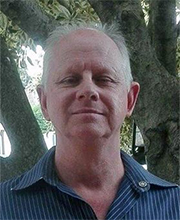
Editor’s Note: Jeremy Opperman is a member of Rotary’s Diversity, Equity, and Inclusion taskforce and a regular contributor to this blog on issues related to disability inclusion.
By Jeremy Opperman, Rotary Club of Newlands, Cape Town, South Africa
Like countless others I imagine, I watched the compelling events to celebrate the birthday of Archbishop Emeritus and Nobel Peace laureate Desmond Tutu, or as he is also fondly known, “The Arch.”
What struck me almost immediately was how the messages from the internationally respected leaders departed from the usual gushy sentimental birthday tributes so loved by celebrities. After short heartfelt tributes to their dearest Arch, South African Professor Thuli Madonsela; Graça Machel, widow of two heads of state (Nelson Mandela and Mozambique’s Samora Machel); and Mary Robinson, former president of Ireland and past UN Special Advisor on the Environment, all leapt straight in with some serious no holds barred truth telling.
Global challenges such as corruption, crime, climate change, and poverty were the order of the day. No mincing of words or diplomatic fluffiness. Just hard facts and straight talking.
I know some people were surprised and even disappointed, expecting perhaps a glamorous biopic of the Arch, made the more memorable by the presence of such deservedly vaunted personalities as the above larger than life three women and also including the Dalai Lama, a great friend of the Arch.
But I loved it!
The truth telling reminded me of a little controversy I witnessed recently while attending a high-level organisational strategy discussion. Essentially, is it wise or appropriate to highlight past mistakes and to regretfully acknowledge an organization failing in the past? The context in this instance was Diversity, Equity, and Inclusion (DEI). It was interesting that not everyone agreed with the idea, preferring rather to downplay the past and highlight future inclusive practices.
When asked, I categorically agreed that disclosure and acknowledgement of past failing was essential if you wished for change in matters of diversity and inclusion. I used the analogy of getting directions to visit someone.
The first thing they will ask when directing you is, “where are you coming from?”
It is normal for people to feel uncomfortable when they face up to the past if they wish to progress in an unfamiliar area. The problem all too often lies in people’s genuine or wilful ignorance of issues making up the status quo.
This must be confronted with hard facts to jolt them into realising that change is paramount, simply because it would be totally unacceptable to continue with the status quo. In a word, the truth.
The sluggish uptake of DEI in so many organizations and societies can absolutely be attributed to both wilful and genuine ignorance. It is essential that this be met with facts and realities to create a working baseline upon which you can drive practical change.
Which is why in my work as a diversity practitioner, I spend a lot of time on dispelling myths and showing the facts and realities of the situation. How else would they know for instance that within South Africa, 65% of children with disabilities don’t go to school; or that there are only 400 special schools in the country and that less than 70 of those go all the way to Grade 12; or that less than 1% of people with disabilities are employed; or that there is near total inaccessibility of public transport; or in the world, less than 6% of books and media are accessible to people with print handicaps such as being blind.
These realities are not stated to solicit pity, they are used to wake us up and to demand change just as Thuli, Graça, and Mary called for change with regards to poverty, corruption, and the climate crisis.
As long as it’s the truth, I applaud truth telling.
Adapted with permission from Rotary Africa. Learn more about Rotary’s Diversity, Equity, and Inclusion task force.

Listen to select blog posts on our new Rotary Voices podcast
https://blog.rotary.org/2021/12/01/is-it-the-truth/
